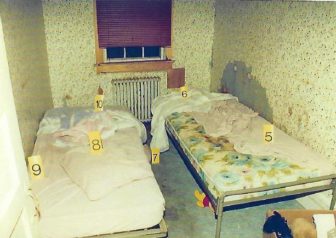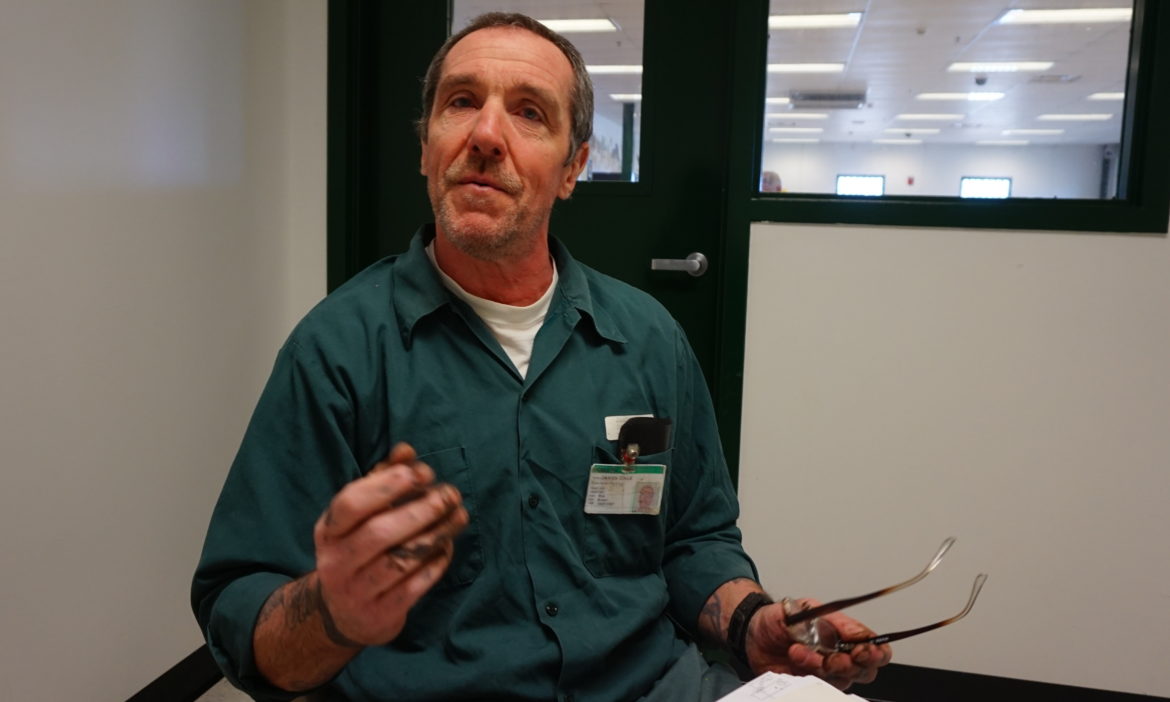CONCORD — A federal magistrate judge has offered Jim Dale his only flicker of hope from the courts since he was convicted of raping and murdering a 6-year-old Hopkinton girl almost two decades ago.
Dale, who is serving a minimum of 60 years in the Northern NH Correctional Facility in Berlin for the July 3, 1997, for raping and smothering Elizabeth Knapp, has maintained his innocence ever since.
The state Supreme Court upheld Dale’s conviction and subsequent attempts at a new trial over the years have failed.
Last week, Federal Magistrate Judge Andrea K. Johnstone recommended that the state’s motion to dismiss Dale’s latest petition for a new trial be dismissed, at least in part.

Crime scene photo. Elizabeth Knapp, 6, was raped and murdered in her bed in a room she shared with her little sister in Hopkinton on July 3, 1997
Her recommendation paves the way at least for further action in his case and the possibility, however slim, of a new trial. The state has the opportunity to challenge Johnstone’s order, which must also be accepted by U.S. District Court Judge Steven McAuliffe, who is in charge of Dale’s case.
Despite the hurdles to come, Dale, 59, was elated during a recent phone call from prison.
“I’m just lost,” Dale said. “I’ve waited so long for a ruling like this that will let me go forward.” All he wants is his day in court, to be able to call witnesses, Dale added.
“So many people didn’t want me to have this chance, but I never gave up,” Dale said.
As soon as possible, Dale said he is going to contact Barry Scheck at the Innocence Project. Last year, the Innocence Project notified Dale that he is still on their list of defendants seeking help with DNA evidence. A Project spokesman wouldn’t confirm whether Dale’s case is under review.
In her report, Johnstone agreed with Assistant Attorney General Elizabeth Woodcock that Dale can’t make an ineffective counsel claim against the lawyer who handled a post-conviction bid for a new trial years ago.
Woodcock had also argued that Dale hadn’t been diligent in seeking court relief and was well beyond the one-year statute of limitations to file the motion for a new trial.
But Johnstone said Woodcock didn’t make any argument as to whether Dale’s actual innocence claim might allow him the chance to move forward on an otherwise untimely federal constitutional claim.
The actual innocence exception “applies to a severely confined category: cases in which new evidence shows ‘it is more likely than not that no reasonable juror would have convicted’” (Dale) in light of the new evidence, Johnstone wrote.
Johnstone also noted that the court doesn’t have a complete record of Dale’s case.
“The district judge should deny the motion to dismiss, to the extent it is based on the statute of limitations, without prejudice to (the state’s) ability to reassert that defense in a motion for summary judgment, after (Dale) files a more complete record,” Johnstone wrote.
Johnstone said Dale’s actual innocence claim was based largely on trial counsel’s failure to call the victim’s mother Ruth Knapp as a witness.
“Trial counsel failed to call Ruth Knapp as a witness who would have testified that she saw (Richard) Buchanan commit the crime,” Johnstone wrote in summarizing Dale’s claims.
Buchanan was Knapp’s live-in boyfriend at the time. Buchanan was arrested and held for five months until DNA tests excluded him as a possible suspect.
Johnstone summarized Dale’s claims of ineffective trial counsel to include: Failing to meaningfully challenge DNA evidence by withdrawing a motion to exclude the evidence before trial.
“The evidence at trial included Dale’s confession to a cellmate as well as DNA evidence showing Dale could not be excluded as the source of the sperm found in and on the victim’s body,” Johnstone wrote.
Dale, who is now representing himself, used the same or similar arguments that attorney Robin Melone filed in Superior Court three years ago. Dale had argued that trial counsel failed to execute loyalty to the client by becoming romantically involved with the prosecutor.
His trial lawyer was Nicholas Brodich and Kelly Ayotte was the assistant attorney general who prosecuted Dale. Both have said they dated, but only after Dale was sentenced.
Brodich and his co-counsel Jim Moir answered the same or similar allegations in past court proceedings, which Superior Court Judge Kathleen McGuire found credible in ruling against a new trial for Dale.
McGuire found that the decision to not call Ruth Knapp to the witness stand “was reasonable and constituted sound trial strategy.” McGuire dismissed Dale’s 2014 petition and a motion to reconsider saying they were untimely and barred by laches, which means Dale delayed too long in seeking relief.
Dale was also convicted of trying to murder a fellow inmate while he was being held in a Pennsylvania prison. He would have to serve a minimum of 21 1/2 years in prison for that crime if ever released from prison here.






